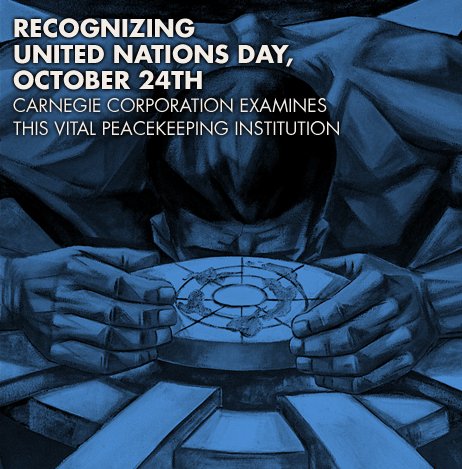
UN Day, October 24th, marks the anniversary of the United Nations’ charter—the birthday, effectively, for this vital peacekeeping institution created in 1945. Since its own inception, Carnegie Corporation of New York has worked to achieve a more secure, peaceful, and prosperous world. It has also funded retrospectives such as the United Nations Intellectual History Project. Through its current program areas, the Corporation supports efforts to reduce the global arsenal of nuclear weapons. In recognition of UN Day 2013, Carnegie Corporation has drawn together some of its recent reports, as well as grantee projects and other resources, that examine the United Nations.
Resources
“Changing Dynamics of UN Peacekeeping”
In light of United Nations Day 2013, Carnegie Corporation’s Laurie Mincieli considers the UN’s expanding role in managing international peace and security. Recently, conflicts in Syria, Somalia, and the Democratic Republic of Congo (DRC), are forcing the UN to confront its capacity limitations and international expectations for what can be achieved.
Andrew Carnegie Distinguished Lecture on Conflict Prevention
David A. Hamburg, former president of Carnegie Corporation, gave the inaugural address of the Andrew Carnegie Distinguished Lecture on conflict prevention at the United Nations on May 1, 2013. “I wanted us to make greater use of the many tools available under Chapter VI of the UN Charter to prevent armed conflict,” Hamburg said.
What’s Wrong with the United Nations and How to Fix It
According to Thomas G. Weiss, a longstanding grantee of Carnegie Corporation, six decades after its establishment the UN still struggles with modern challenges to world order—and the UN's system of related agencies and programs is perpetually in crisis. His 2012 book, What’s Wrong with the United Nations and How to Fix It, takes a diagnosis-and-cure approach to the world organization’s troubles and outlines substantial changes in intergovernmental institutions needed to bring the UN back to health. Weiss is presidential professor of political science at the Graduate Center of the City University of New York, and director of the Ralph Bunche Institute for International Studies, where he is co-director of the UN Intellectual History Project.
“Peace in Our Time?”
Shaped by Carnegie Corporation funding, the United Nations’ start-up Peacebuilding Commission strives to bring security to a conflict-ridden world. This article, from a 2008 issue of the Carnegie Reporter, examines the Commission’s progress.
Strengthening the Work of the United Nations: A Sustained Strategy for Peace [PDF]
Beginning with an examination of Andrew Carnegie’s early investments in the Peace Palace at The Hague and his support of the League of Nations, this 2006 issue of Carnegie Results traces the close relationship between Carnegie Corporation of New York and the United Nations, and the many examples of support provided to the international body by the foundation.
Human Security and the UN: A Critical History
What does security—particularly human security—mean? This 2006 volume in the United Nations Intellectual History Project series traces the fundamental shift in the contemporary notion of security from its emphasis on the state to the individual, focusing on the UN’s role in redefining this critical concept. Co-authored by two Oxford University-based international security scholars, this probing analysis of what is good, bad and indifferent about the way in which we look at the problem of security, explores its ideation from the era of nation states to the early twenty-first century.
Converging Priorities: Toward a Coherent Foundation Strategy [PDF]
This 2004 report, based on a meeting convened by Carnegie Corporation and the United Nations Foundation, asks complex questions: How can the international community more effectively help states recover from the ravages of war and civil strife and avoid the anarchy leading to a social and political vacuum that invites more bloodshed and threatens neighbors, regions and the world? And what possible role can U.S. philanthropy play in helping international agencies address the many challenges confronting “states at risk” and bring “failed states” back from the abyss?
- Press Releases


